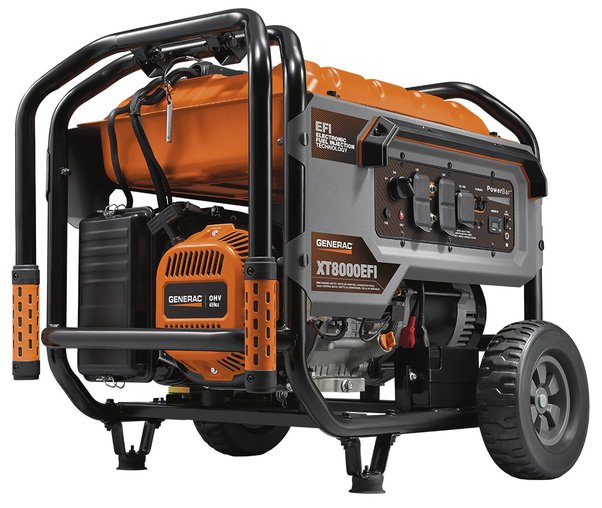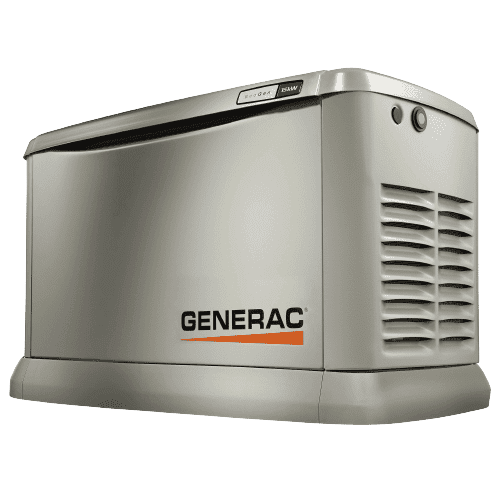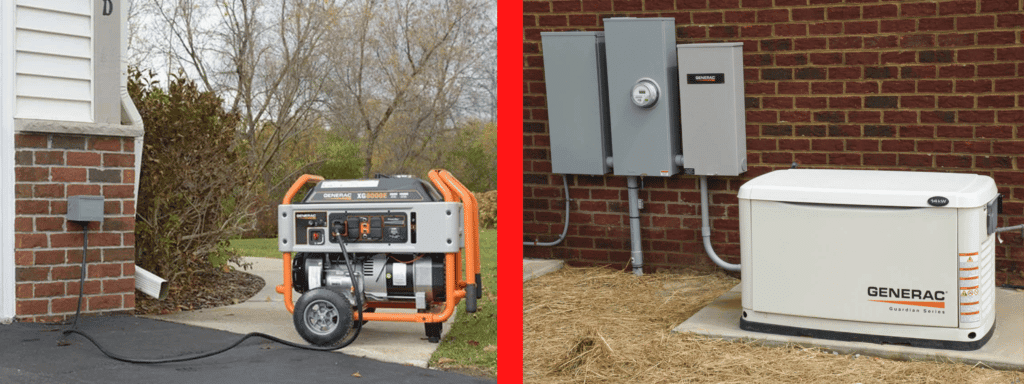Nothing makes us more conscious of our dependence on electricity than a sudden power outage. You are sitting alone in a dark room, full of questions about how to deal with your predicament. When was the last time you saved a project you were working on? Do you have a candle? Where is it? Should you follow Twitter for updates, or is it even a smart move to save your phone’s battery incase of an emergency? But just how long can you wait before you carry on with your normal activities?
The severity and frequency of blackouts has been steadily increasing for decades, combined with intensifying weather and aging infrastructure, and the trend shows no signs of changing. If you’re looking to keep your home running through a blackout, a generator is the way to go. However, as with most things, it’s important to choose the right tool for the task at hand.
This portable vs. standby generator comparison article explains the differences between the two and which one is better for you. In general, the main differences lie in the fact that the portable generators are more compact, less expensive, don’t need professional installation and are less-powerful than the standby generators. However, before comparing their features directly, let’s go further and analyze their strengths and weaknesses.
Portable generator: Definition, pros and cons

Portable generators, as the name suggests, are generators that can be easily moved or transported from one place to another. They are also called backup generators, and are used to provide temporary power when and where it is needed. The most common types are compact ultra-quiet inverter generators and conventional open frame generators.
These generators typically have small to medium sized tanks of 0.9 to 20 gallons and run on diesel, gasoline, propane or natural gas. However, some newer dual-fuel models are designed to use gasoline and propane.
But are all “portable” generators really portable? Not all portable generators are portable. Some weigh over 150 pounds and are huge. Features that make them portable include large wheels and handles, which makes them eligible for classification as “portable” models.
These types of generators can be used in homes, construction sites and for outdoor recreational purposes. Their output power ranges from about 1,000 to 25,000 watts. Portable generators that power around 1000W to 2500W typically have easy-to-grip handles to take them anywhere with you, and their dry weight is typically under 50 pounds. For example, the WEN 56200i alternator weighs 48 pounds, while the Honda EU2200i weighs about 40 pounds.
Pros:
- Small and lightweight
- Can be used in RV, outdoor and home
- Some have encapsulated designs
- The “portable” ones are really quiet
- Not as expensive as standby type
Cons:
- Usually have a small tank
- Some are not so portable
Check out our Guide To Buying A Home Generator For Learning More About Generators
Whole-house, Stand-by generators: Definition, pros and cons

Standby generators, also called whole-house or fixed generators, are permanently installed outside the house (like an AC unit) and comes on automatically when the power is out – whether you’re home or away. They connect to your home’s natural gas or liquid propane system so there are no extension cords and no refueling with gasoline, just backup power when you need it most.
However, standby generators can also be used for powering homes. Their power ranges from 8 kilowatts to over 100 kilowatts. Standby generators have an insulated cover and are most often weatherproof. Therefore, unlike portable generators, it can be used continuously outdoors even in rainy or sunny weather. Standby generators use diesel, propane, or public supplied natural gas.
These types of generators can be started automatically thanks to the transfer switch, making them ideal for use in organizations and homes requiring uninterruptible power supplies. For example, if there is a power outage in a hospital, it can start up immediately. Backups are therefore the most reliable type of backup. According to most reviews, Generac developed home standby generators are the most reliable and proven.
Pros
- Reliable
- auto start
- very powerful
- insulating cover
- Weatherability
- big tank
Cons
Permanently installed; not portable
Direct Comparison
When it comes to deciding whether you need a standby home generator or a portable generator, one of the first things you need to know is how these generators differ. A portable generator to home standby generator comparison is almost like comparing a moped to a motorcycle. The scooter will get you through town, but it’s not made for a road trip on the highway.
We’ll pitch both types of generators side by side to see how they compare using criteria like performance, fuel economy, price, and versatility and more.
Power output
Before making any concrete decisions, it is necessary to make a list of the most important devices and calculate the energy required for their operation. Some products have two values. One is the wattage required to boot the device and the other is the wattage required to operate. Allow some leeway when estimating this number, as most generators cannot run at full capacity for long periods of time. Knowing how much power you need to keep your device powered up can go a long way when deciding which generator to use.
Many consumer electronics require significant wattage to operate. About 2400 watts can be used to start and run a refrigerator, about 2600 watts for a washing machine, and 3000 watts for a dishwasher. It’s easy to see that a low-output generator will struggle to provide enough power to keep your entire house running.
The maximum output of portable generators is about 15,000 watts. You have to be very careful when deciding which lights and appliances to leave on, especially if you need power for more than a few days, as the output is pretty low. And while you can probably keep an appliance or two running, portable generators aren’t powerful enough to power AC appliances or a heater or furnace.
On the other hand, Standby or fixed home generators have a very high power output. Their power output range between 10 to 50 kilowatts. So With the right home generator, you can keep all the appliances in your home running perfectly. Or at least give yourself some leeway to use the washing machine from time to time. More importantly, you can power your AC unit or furnace from your home generator. These generators act as a backup to the main power supply, ensuring normal operation even with wired devices.
So, the winner in this area is clearly the Standby or fixed home generator.
Read more on the size of home generator to choose for your home based on power output
Fuel-efficiency
Portable generators are usually powered on gasoline. Gasoline is considered as the most widely used fuel for a portable generator. There are other models of portable generators which use diesel and propane. The ones that use propane run for hours on a small propane tank like a gas grill. The 6500 watt portable generator burns about 18 gallons of fuel per day when operated at half its rated load capacity use. That’s slightly less power than two standard 15 amp outlets in your home.
If you’re looking for a place to buy gasoline during a power outage, finding a petrol station with electricity at that particular moment can keep you hours in line. This means that if you have a generator that runs on gasoline, you must always have a sufficient quantity of fuel on hand. But it’s not always simple to do that. Large quantities of gasoline stored on your property are prohibited by many local fire departments because they pose a fire risk. Family Handyman claims that the maximum is typically 25 gallons.
Standby generators run on natural gas or propane. They connect directly to your existing natural gas supply or propane tank. With natural gas, you can run for days or weeks depending on your needs. Filling a propane tank is as easy as calling the LPG company.
Compared to gasoline, propane burns cleaner. According to research from the U.S. Energy Information Administration, not only is there no offensive odor, but it also emits less CO2 for the same amount of heat. Generators that run on propane or gas last longer and are less expensive to maintain than those that run on gasoline.
Standby generators are however more fuel-efficient.
Price
Portable generators can handle the power needs of just a handful of devices, while standby generators are powerful enough to power the devices and appliances that your family is already familiar with. So the rest of the block is in the dark. while your house continues to hum as if nothing happened.
Of course, this comfort doesn’t come cheap. The average cost of a portable generator ranges from $500 to $2,000 for a generator that can handle up to 7000 watts and power most lights and appliances in a single family home. There is a minimum set-up cost of $530 to $2,030 in total, including the fuel purchase that may cost about $30 for 48 hours of use.
A home standby generator for the model, which can power an entire home, costs about $2,000 to $6,000. You also have to consider that standby generators require installation, which may require calling in a licensed professional at extra cost.
What makes the price more palatable is the fact that standby generators typically last about 15 years. And when resold at home, these machines recoup about 50% of the cost. Although maintenance is necessary every two years, licensed professionals can help ensure a unit’s reliability. And for some families, especially those who have critical medical equipment around the house, the reliability of a backup generator is practically invaluable.
Portable generators win this one.
Versatility
Portable generators are more versatile. They can be used in homes, RVs and outdoor areas. For example, a portable generator can be pushed into the field to provide power for mowing the lawn. You can even charge your smartphone or laptop or power your BBQ grill while camping in remote areas.
Even large and heavy generators can be carried with wheels. Some come with a wheelset, others need to be purchased.
Standby generators, on the other hand are permanently installed outside the house.
Portable generators are more versatile.
Runtime
Portable generators can run up to 2,000 total hours. Unlike standby generators, portable generators are designed to run for shorter increments of time – typically about 6-18 hours. These machines will come in handy for RVs on camping trips or to power certain home appliances in an emergency but are not recommended for use during long-term power outages.
A standby generator is stationary and is designed to provide power to residential or commercial buildings for up to several days depending on its size, fuel source, and brand. Unlike portable generators, standby generators are made specifically for use in longer-span emergency situations.
At its best, a standby generator can run for up to 3,000 hours powering a medium-sized home. Though it is recommended you do not run a standby generator for longer than 500 hours continuously.
So, if you average 3 blackouts a year and use your generator for about 30 hours per blackout and add the time you run it for maintenance, your generator could last up to 50 years.
Standby generators have longer runtime with better fuel efficiency.
Safety
Portable generators produce large amounts of carbon monoxide gas during operation. Therefore, always use your generator outdoors, away from doors and windows, and never in an enclosed environment such as a garage. Carbon monoxide poisoning can be fatal with prolonged inhalation of the gas. Even small exposures can cause headaches, flushing, and other problems.
The standby generator reduces the risk of carbon monoxide as compared to traditional portable generators, this type of generator produces less of this deadly gas. Also, standby generators are often installed outdoors, thus eliminating this risk.
However, the portable generator has safety features such as overload protection and a low oil shutdown feature to protect the life of your engine.
Standby Generator wins this one.
Maintenance
Portable generators require little or no maintenance, other than checking that the fuel is out before storage and checking that there is no corrosion or loose wires before operation.
Standby generators require more maintenance. Some standby generators indicate a problem or need maintenance by flashing a yellow or red light. Others require only an annual inspection. If the generator has been running continuously for 24-48 hours, it should be serviced. If it’s been running for 10 days, you should also change the oil and filters. Many generator companies offer maintenance plans where you pay a monthly fee and the maintenance checks are done automatically. They also remain on call in case your generator has a more immediate problem. These types of plans typically cost around $400 per year, depending on the region and type of generator.
Portable generators edge standby models this time.
Installation

Portable generators rarely need to be installed. Just set up your generator, install fuel, plug it in, and turn it on. These generators are heavy and can require hazardous fuel sources if not stored properly.
Standby generators must be professionally installed, usually by the company that sells them. In addition to the installer, a plumber is required to connect the generator to a fuel source, either natural gas or propane, and an inspection must be performed by the fuel supplier. For example, when using propane, a plumber runs a pipe from the propane tank to the generator. Meanwhile, the generator installer installs the switchboard indoors near the switchboard. Before the propane is switched on, an inspector from the propane supplier must check the work. This usually requires a permit and in some cases additional approval by the fire department for professional installations.
Looking to buy a generator?
Choosing the right generator can be difficult. When comparing portable and standby generators, you may wonder whether it is worth investing in a standby generator instead of a portable generator. Our team of generator experts have all the skills and experience you need to select the right generator for you and your home.
Contact Airplus for a free consultation today!
.2309121422550.png)

